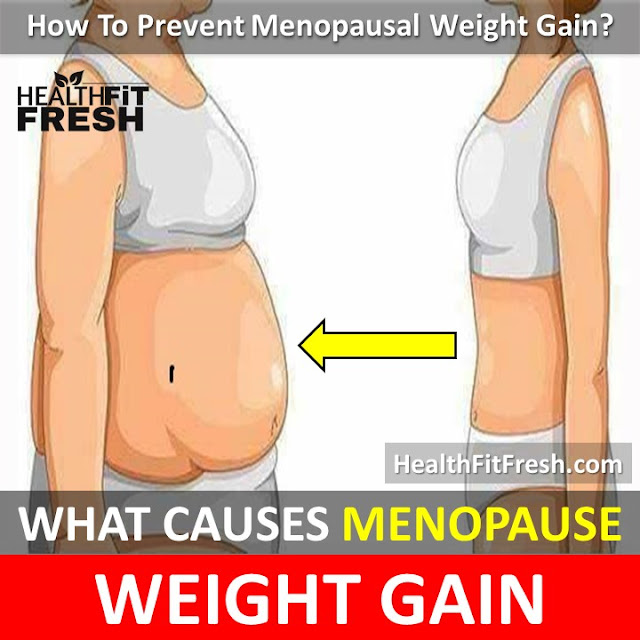What Is Menopause?
Menopause:
Menopause is a period in a woman's life (typically between the ages of 45 and 50) when menstruation ceases. Menopause is the time when a woman stops having menstrual periods marking the end of her reproductive period.
Many women experience a variety of symptoms as a result of the hormonal changes associated with the transition to menopause.
Many women experience a variety of symptoms as a result of the hormonal changes associated with the transition to menopause.
Menopause Weight Gain: Causes and Preventions
Aside from the hormonal imbalances manifested by hot flashes, mood swings etc. One of the hardest things to accept about menopause is the uncontrollable weight gain. It’s no wonder most women have a hard time accepting their once toned body turning into a flabby mess.
Unfortunately, these body changes occur even if you’re exercising regularly and watching what you eat. Most women become desperate because no matter what they do, they’re only putting on weight.
What Causes Menopause Weight Gain?
Menopausal weight gain is normally attributed to 4 factors that cause menopause weight gain:
- Stress and Emotions
- Toxins
- Out of Balance Hormones
- Poor Sleep
1. Stress And Emotions
What makes stress one of the major culprits for many health issues including menopausal weight gain is the fact that it results in high cortisol levels and eventually in adrenal fatigue.
This makes the body go into survival mode and the cortisol receptors in the abdomen store fat. Excessive stress also triggers unhealthy food cravings and the body compensates further by releasing neuro-hormonal factors that put you in survival mode, which leads to inflammation and weight gain.
2. Toxins
Toxin buildup in the body is another contributing factor to menopausal weight gain. Toxins are everywhere – in the food we eat, the water we drink, and the environment we live and work in. This toxic overload not only stresses the liver, but also the digestive track, both of which play crucial roles in maintaining the body’s balance and reducing inflammation.
Inflammation, on the other hand, leads to a hormonal imbalance, which raises your risk of disease. Also, it compromises the body’s immune response to food sensitivities and infections. Inflammation also leads to internal swelling and causes weight gain.
3. Out Of Balance Hormones
Hormonal imbalances are the main indicator of menopause. As estrogen levels decrease during this time, the body tries to hold on to that little estrogen by increasing fat storage around the mid-section. In addition, underactive thyroid and insulin resistance, both of which account for increased fat storage are also symptoms of menopause.
4. Poor Sleep
Sleeplessness is another side effect of menopause most women have to put up with. The thing is out-of-balance hormones cause night sweats, which seriously affect sleep quality.
And, that’s not all. Changes in neuro-chemical balance resulting from low serotonin have negative impact on mood while lower melatonin levels affect sleep. These changes also increase two very important hormones that help regulate appetite and weight – leptin and ghrelin.
How Risky Is Weight Gain After Menopause?
Menopause weight gain can have serious implications for your health. Excess weight increases the risk of heart disease, type 2 diabetes, breathing problems and various types of cancer including breast, colon and endometrial cancer.
How To Prevent Menopausal Weight Gain?
Tips To Prevent Menopausal Weight Gain
- Address stress and emotional challenges.
- Reduce toxic overload through a well-balanced diet, drinking filtered water, and staying away from environmental toxins as much as possible.
- Optimize hormonal balance.
- Don’t over-exhaust yourself with strenuous physical exercise and starvation.
- Learn how to help your body regain its proper function.
Best Way To Prevent Weight Gain After Menopause?
There's no magic formula for preventing — or reversing — menopause weight gain. Simply stick to weight-control basics:
1. Move More
Aerobic activity can help you shed excess pounds and maintain a healthy weight. Strength training counts, too. As you gain muscle, your body burns calories more efficiently — which makes it easier to control your weight.
For most healthy adults, experts recommend moderate aerobic activity, such as brisk walking, for at least 150 minutes a week or vigorous aerobic activity, such as jogging, for at least 75 minutes a week. In addition, strength training exercises are recommended at least twice a week. If you want to lose weight or meet specific fitness goals, you might need to exercise more.
2. Eat Less
To maintain your current weight — let alone lose excess pounds — you might need about 200 fewer calories a day during your 50s than you did during your 30s and 40s.
To reduce calories without skimping on nutrition, pay attention to what you're eating and drinking. Choose more fruits, vegetables and whole grains, particularly those that are less processed and contain more fiber.
Legumes, nuts, soy, meat, fish or chicken are healthy protein options. Replace butter, stick margarine and shortening with oils, such as olive or vegetable oil.
3. Check Your Sweet Habit
Added sugars account for nearly 300 calories a day in the average American diet. About half of these calories come from sugar-sweetened beverages, such as soft drinks, juices, energy drinks, flavored waters, and sweetened coffee tea.
Other foods that contribute to excess dietary sugar include cookies, pies, cakes, doughnuts, ice cream and candy.
4. Limit Alcohol
Alcoholic beverages add excess calories to your diet and increase the risk of gaining weight.
5. Seek Support
Surround yourself with friends and loved ones who support your efforts to eat a healthy diet and increase your physical activity. Better yet, team up and make the lifestyle changes together.
Remember, successful weight loss at any stage of life requires permanent changes in diet and exercise habits. Commit to lifestyle changes and enjoy a healthier you.


